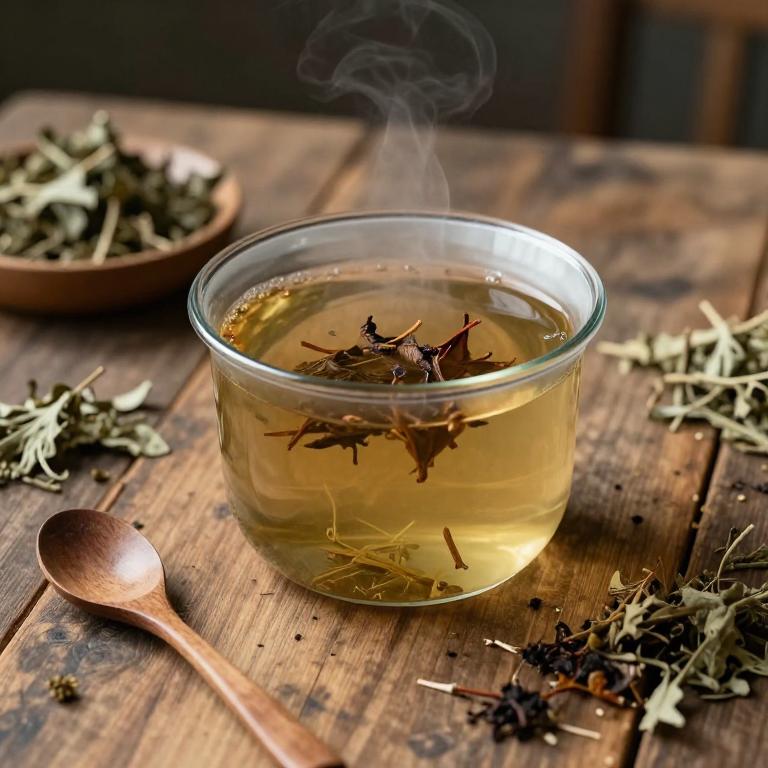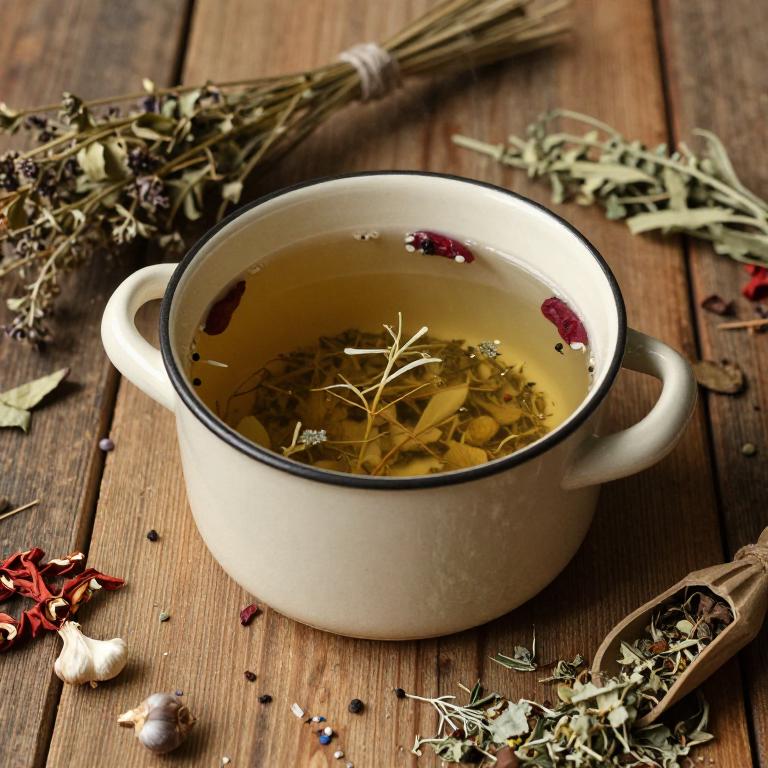10 Best Herbal Decoctions For Sunburn

Herbal decoctions have been traditionally used to soothe and heal sunburned skin by leveraging the anti-inflammatory and cooling properties of various plants.
Common herbs such as aloe vera, chamomile, calendula, and green tea are often included in these decoctions due to their ability to reduce redness, irritation, and pain associated with sunburn. To prepare a herbal decoction, the dried herbs are steeped in hot water for several minutes, allowing the active compounds to infuse into the liquid. Applying the cooled decoction to the affected skin can provide a calming effect and may help in the recovery process.
While herbal decoctions can be a natural remedy, it is advisable to consult a healthcare professional for severe sunburn cases.
Table of Contents
- 1. Aloe vera (Aloe barbadensis)
- 2. Marigold (Calendula officinalis)
- 3. St. john's wort (Hypericum perforatum)
- 4. English lavender (Lavandula angustifolia)
- 5. Chamomile (Matricaria chamomilla)
- 6. Dog rose (Rosa canina)
- 7. Chaste tree (Vitex agnus-castus)
- 8. Echinacea (Echinacea purpurea)
- 9. Stinging nettle (Urtica dioica)
- 10. Ginger (Zingiber officinale)
1. Aloe vera (Aloe barbadensis)

Aloe barbadensis, commonly known as aloe vera, is widely recognized for its soothing and healing properties, making it a popular choice for treating sunburn.
Herbal decoctions of aloe vera involve preparing a concentrated liquid by simmering the gel extracted from the plant’s leaves, which retains its active compounds such as polysaccharides, enzymes, and antioxidants. These decoctions can help reduce inflammation, promote skin regeneration, and provide a cooling effect to alleviate the discomfort of sunburned skin. When applied topically, aloe vera decoctions may also help hydrate the skin and prevent peeling.
However, it is important to ensure the decoction is properly prepared and diluted to avoid irritation, as some individuals may have allergic reactions to the plant.
2. Marigold (Calendula officinalis)

Calendula officinalis, commonly known as the pot marigold, has been traditionally used for its soothing and anti-inflammatory properties, making it a popular choice for treating sunburn.
Herbal decoctions made from dried calendula flowers can be prepared by simmering the petals in water, creating a calming infusion that can be applied topically to the skin. This natural remedy helps to reduce redness, irritation, and pain associated with sunburn due to its high content of flavonoids and triterpenes. When used as a compress or topical application, calendula decoctions provide a gentle, nourishing effect that promotes healing and skin regeneration.
While calendula is generally safe for most skin types, it is advisable to perform a patch test before use, especially for those with sensitive or allergic skin.
3. St. john's wort (Hypericum perforatum)

Hypericum perforatum, commonly known as St. John's wort, has been traditionally used for its anti-inflammatory and soothing properties, making it a potential remedy for sunburn.
Herbal decoctions of Hypericum perforatum can be prepared by simmering the dried plant material in water, allowing the active compounds to infuse into the liquid. These decoctions may help alleviate the redness, pain, and irritation associated with sunburn by reducing inflammation and promoting skin healing. However, it is important to note that St. John's wort can interact with certain medications and may cause photosensitivity, so caution is advised.
While some studies suggest its topical use may offer relief, it is recommended to consult a healthcare professional before using it for sunburn treatment.
4. English lavender (Lavandula angustifolia)

Lavandula angustifolia, commonly known as English lavender, has been traditionally used for its soothing and anti-inflammatory properties, making it a popular choice for herbal decoctions aimed at alleviating sunburn.
When prepared as a decoction, the flowers of lavender release compounds such as linalool and lavandulyl acetate, which have demonstrated antioxidant and cooling effects that can help reduce redness and inflammation associated with sunburn. Applying a cooled lavender decoction to the skin can provide immediate relief by soothing the affected area and promoting a calming sensation. This natural remedy is often preferred for its gentle nature, making it suitable for sensitive skin.
However, while lavender decoctions may offer symptomatic relief, they should not replace proper sun protection and medical treatment for severe burns.
5. Chamomile (Matricaria chamomilla)

Matricaria chamomilla, commonly known as chamomile, has been traditionally used for its soothing and anti-inflammatory properties, making it a potential remedy for sunburn relief.
Chamomile herbal decoctions can be prepared by steeping dried flowers in hot water, creating a calming tea that can be applied topically to the affected skin. The essential oils in chamomile, such as bisabolol and chamazulene, possess antioxidant and anti-inflammatory effects that may help reduce redness and irritation caused by sunburn. While chamomile is generally considered safe for topical use, individuals with allergies to plants in the Asteraceae family should exercise caution.
Although chamomile may offer some comfort, it is not a substitute for proper sun protection and should be used as a complementary treatment alongside medical advice.
6. Dog rose (Rosa canina)

Rosa canina, commonly known as dog rose, has been traditionally used in herbal medicine for its soothing and anti-inflammatory properties.
A decoction of Rosa canina fruits can be prepared by simmering the dried berries in water for several minutes, creating a nourishing and cooling herbal tea. This decoction is believed to help alleviate the pain and redness associated with sunburn due to its high content of vitamins, particularly vitamin C, and antioxidants. The cooling effect of the decoction may also help to reduce skin irritation and promote healing.
While it is often used as a complementary remedy, it is advisable to consult a healthcare professional before using it for severe sunburn cases.
7. Chaste tree (Vitex agnus-castus)

Vitex agnus-castus, commonly known as chaste tree, has been traditionally used in herbal medicine for its potential soothing and healing properties.
While it is not a primary treatment for sunburn, some herbalists suggest using a decoction of vitex agnus-castus as a topical remedy to alleviate skin irritation and reduce inflammation. The decoction is typically prepared by simmering the dried berries in water, creating a cooling infusion that can be applied to the affected skin. However, it is important to note that there is limited scientific evidence supporting its effectiveness for sunburn, and it should not replace conventional treatments such as aloe vera or cool compresses.
As with any herbal remedy, it is advisable to consult a healthcare professional before use, especially for individuals with known allergies or sensitivities.
8. Echinacea (Echinacea purpurea)

Echinacea purpurea, commonly known as purple coneflower, is a traditional herbal remedy often used for its immune-boosting properties.
While it is not a substitute for conventional sunburn treatments, some studies suggest that echinacea may have anti-inflammatory and antioxidant effects that could potentially aid in skin recovery after sun exposure. Herbal decoctions made from echinacea roots and leaves are sometimes prepared by simmering the dried plant material in water for several minutes. However, it is important to note that there is limited scientific evidence supporting the effectiveness of echinacea for treating sunburn specifically.
Individuals should consult a healthcare professional before using echinacea, especially if they have sensitive skin or are taking other medications.
9. Stinging nettle (Urtica dioica)

Urtica dioica, commonly known as stinging nettle, has been traditionally used in herbal medicine for its anti-inflammatory and soothing properties.
When prepared as a decoction, it can help alleviate the discomfort associated with sunburn by reducing inflammation and redness. To make the decoction, the fresh or dried leaves are boiled in water for about 15 to 20 minutes, then strained and cooled before application. This herbal remedy is often used externally as a compress or bath to cool the skin and promote healing.
While it may offer relief, it is important to consult a healthcare provider before using it, especially if there are underlying skin conditions or allergies.
10. Ginger (Zingiber officinale)

Zingiber officinale, commonly known as ginger, has been traditionally used in herbal medicine for its anti-inflammatory and cooling properties.
When prepared as a herbal decoction, ginger can help alleviate the discomfort associated with sunburn by reducing inflammation and soothing irritated skin. To make the decoction, fresh ginger root is sliced and simmered in water for several minutes, then cooled and applied topically. Some studies suggest that the active compounds in ginger, such as gingerol and shogaol, may provide antioxidant benefits that support skin healing.
However, it is important to note that while ginger may offer some relief, it should not replace proper sun protection and medical treatment for severe sunburn.